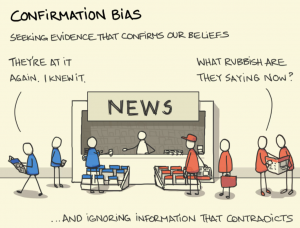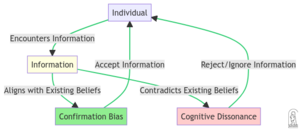Confirmation Bias
Confirmation bias is the tendency to search for, interpret, favor, and recall information in a way that confirms or supports one's prior beliefs or values[1].
The bias leads us to live in a world of our own choosing, finding the information that already fits with our beliefs and ignoring or discounting what doesn't. It's the bias that makes two sides get further apart rather than closer together (polarization).
A great metaphor for this is to think of channels of water. As water runs through the channels the channels get deeper, and as they get deeper it pulls more of the water into the main channels until there is only one way. As with information which does not affect cognitive dissonance, it is pleasing, and can act like a trap sending you down a rabbit hole of confirming information. Whereas to be truly unbiased and have a better view of reality we must look at both sides of the coin.
Practical Examples
For example, a person with conservative leanings might prefer news outlets that present conservative viewpoints, and vice versa for a person with liberal leanings (See Figure 1). This unconscious reinforcement then leads them to interpret elsewhere ambiguous news stories in a way that aligns with their political beliefs. This selective exposure to information can create an echo chamber, reinforcing and amplifying their existing views while dismissing or ignoring contrary information. Over time, this can lead to increased polarization, as individuals become more firmly entrenched in their political beliefs and less open to alternative viewpoints.
How to protect against confirmation bias...
To combat confirmation bias, it's important to understand that when the human mind comes to agree with something it starts to associate with it. Then once confirmation bias gets to work information starts to assimilate into the ego and starts to become defended by cognitive dissonance.
It is important to consider different opinions and not immediately discount them upfront and then to use our empathy to understand why others feel the way they do. When we deliberately seek out information that challenges our point of view we will usually find a richer, more nuanced world that helps build bridges with others rather than drive us apart. A useful tool that enables many to better see these types of biases within themselves are the inducement of pivotal mental states.
Authority Bias
Research suggests that greater authority is given to financial advisors who confirm one’s existing opinions, implying that authority bias is strengthened when it coincides with confirmation bias[2].
The Diderot Effect
This is an effect where we surround ourselves with information that confirms preexisting beliefs. The Diderot Effect takes this into the physical realm, we generally surround ourselves with objects that fit our current sense of identity.
References
- ↑ https://pages.ucsd.edu/~mckenzie/nickersonConfirmationBias.pdf
- ↑ "Evaluating experts may serve psychological needs: Self-esteem, bias blind spot, and processing fluency explain confirmation effect in assessing financial advisors' authority". Zaleskiewicz, Tomasz; Gasiorowska, Agata (2020). Journal of Experimental Psychology: Applied. 27 (1): 27–45. doi:10.1037/xap0000308. PMID 32597675.

